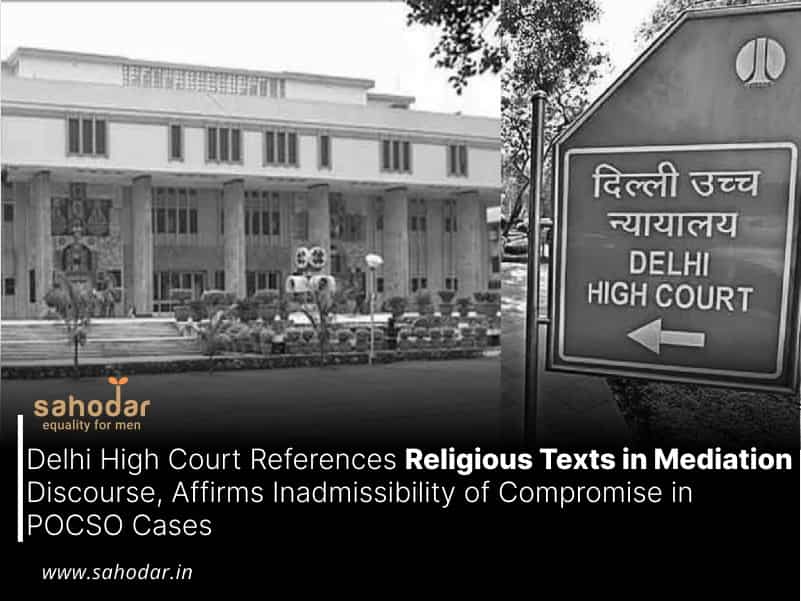The Court made it clear that cases under the Protection of Children from Sexual Offences Act (POCSO Act) cannot be referred to mediation and settled or compromised.
In a recent case (Rajeev Dagar v State & Ors), the Delhi High Court referenced ancient texts including the Ramayana, Mahabharata, Bhagavad Gita, Bible, Qur’an, and Kautilya’s Arthashastra. Justice Swarana Kanta Sharma highlighted verses from these texts to underscore the significance of mediation. She emphasized that understanding these texts beyond their religious context is crucial for harnessing the full potential of mediation in resolving disputes effectively.
“This Court thus, opines that it is not on the basis of the British or other foreign Jurisprudence alone but on the basis of unplundered wealth of ancient Indian Judicial and mediation jurisprudence which is found in our old texts including Ramayana (रामायण), Mahabharata (महाभारत), Bhagavad Gita (श्रीमद्भगवद्गीता), when read and understood in detail in context of the messages conveyed in certain chapters, subject to their true interpretation and understanding without being referred to as religious texts alone,” the Court said.
The Court additionally referenced passages from the Qur’an, Bible, and Arthashastra to underscore the historical utilization of mediation as a means to resolve disputes.
“As per the Holy Bible, Matthew 5:9 urges Christians to use useful means to resolve disputes amicably and that those who are peacemakers shall be called sons of God. Matthew 18:15-17 states that in case of a deadlock, the parties should contact a third neutral party to get their issue resolved. Even in Islam, the Holy Qur’an, the Sunna, the Ijma, and the Qiyas support peaceful conflict settlement within the Islamic community, between Islamic and non-Islamic communities, and between two or more non-Muslim communities…. Arthashastra (अथथशास्त्र) by Kautilya and the principles enumerated by the judges, commentaries, lectures and mediation training on mediation process will have the potential to give finality to disputes between the parties,” the judgment stated.
The Court firmly stated that cases falling under the Protection of Children from Sexual Offences Act (POCSO Act) cannot be directed to mediation for settlement or compromise.
This stance was taken during the consideration of a petition filed by an individual seeking to overturn a trial court’s decision to dismiss a complaint lodged under Section 7 of the POCSO Act in 2015.
Section 7 addresses individuals who engage in sexual acts with a child with explicit intent, defining such actions as sexual assault.
The complaint was filed by a father, alleging that his two children, a boy and a girl, had been subjected to inappropriate touching by their maternal uncle.
Initially, the trial court referred the disputes between the complainant and his spouse, including the registration of the POCSO complaint, to mediation, subsequently closing the complaint upon reaching a settlement between the parties.
However, the complainant later contested the trial court’s decision before the High Court, claiming he had been deceived by his wife and brother-in-law into withdrawing the complaint.
Upon review, Justice Sharma affirmed that offenses under the POCSO Act cannot be mediated, settled, or compromised, rejecting any notion that monetary compensation could resolve such cases.
She asserted that any attempt to mediate or settle POCSO cases would undermine justice principles and victims’ rights, stating unequivocally that such cases should not be entertained by mediators under any circumstances.
Nevertheless, in this instance, the Court declined to revive the complaint, noting that nearly a decade had elapsed since the trial court’s ruling and indicating that the children had become pawns in their parents’ personal disputes.
“Therefore, in view of the detailed discussion made in the preceding paragraphs, this Court is not inclined to allow the reliefs sought in this petition i.e. quashing of order dated 08.04.2015 and restoration/revival of complaint which was filed under POCSO Act before the learned Special Court when the victims themselves have not prayed for the same, and thus, the prayer in this petition stands rejected,” the Court ordered while rejecting the father’s plea.

